Swiping Right in 2020: How People Use Dating Apps
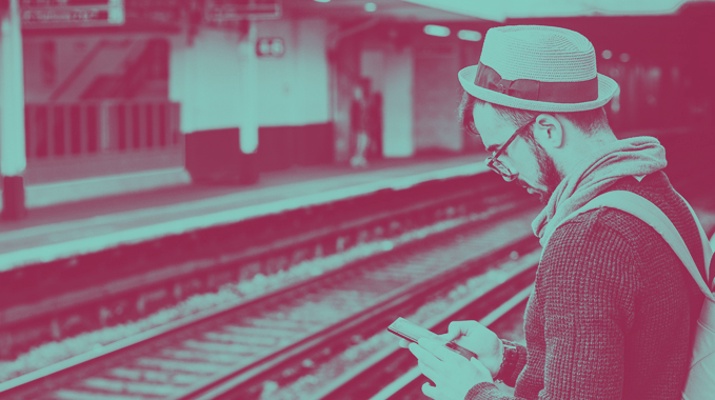
Swiping Right in 2020: How People Use Dating Apps
Dating apps both offer solutions and add to dating world woes, allowing people to connect with a seemingly infinite dating pool. Some might find this a fairy tale, while others might find it less charming.
If the classic fairy tales were modernized, how would our favorite couples have met? Perhaps Ariel and Prince Eric would have matched on Plenty of Fish, Anna and Kristoff on Tinder, Belle and the Beast on Bumble, and Cinderella and Prince Charming through Craigslist’s “Missed Connections.”
Dating apps have changed how we think about and approach social relationships and personal connections.
“They met online” was once a taboo topic whispered in hushed tones. But the advent of dating apps changed this.
Now, it’s almost expected for people to say they met on Tinder, Hinge, Bumble, OkCupid, or another dating app or website.
With so many dating apps to choose from, those looking for love or something more casual can likely find one that caters to their preferences.
“No one is embarrassed about meeting online anymore,” said Jess McCann, a relationship coach and author of "Cursed? Why You Still Don't Have the Relationship You Want and the 5 Cures That Can Transform Your Love Life." “It’s become a social norm. If you are single and you aren't online, people now ask ‘Why not?’ We've gotten used to the internet, and since we now shop, bank, buy, sell, read, write, work, and play online, why wouldn't we date that way as well?”
Since we now shop, bank, buy, sell, read, write, work, and play online, why wouldn't we date that way as well?
Even though experts predicted dating app growth to slow in 2019, revenue for these apps continues to grow. The Manifest found that more than one-third (37%) of people in the U.S. have used a dating app in the past six months, suggesting they’re here to stay.
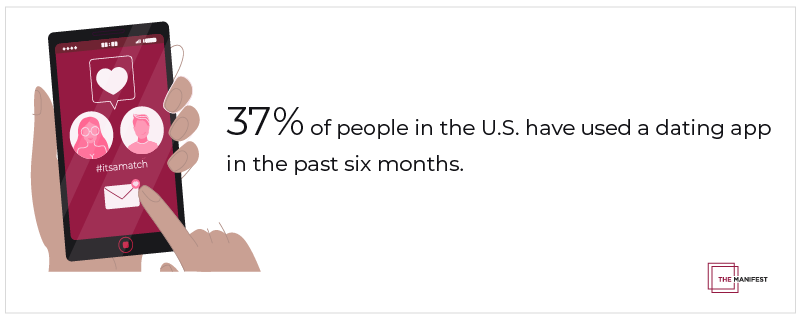
The Manifest surveyed 187 dating app users to learn what motivates people to download and delete the apps and what they’re looking for while “swiping” through potential matches.
Our Findings
- More than one-third (37%) of internet users in the U.S. have used a dating app in the last six months.
- People download dating apps because they are curious (29%), want something convenient (19%), are bored (15%), are lonely (12%), or are hopeful (12%).
- Five percent (5%) of dating apps users download dating apps because they want to “rebound” from a recent breakup.
- Women are most likely to “swipe right” on a potential match if the person exhibits similar interests (33%), while men are most likely to “swipe right” if the person is attractive (40%).
- Nearly three-fourths (72%) of dating app users have blocked another user at least once in the past six months. In addition, 60% of dating app users have reported another user to the platform, suggesting not every dating app user minds their manners.
- Eleven percent (11%) of dating app users deleted a dating app in the past six months because they didn’t feel safe using the platform, even with the option to block or report people who harass other users on the platform.
- Nearly every dating app user (93%) has deleted a dating app in the last six months, suggesting dating app users have a tumultuous relationship with the apps.
- The top three reasons people delete dating apps are because they got bored (25%), the app stressed them out (18%), or they met someone through the app they wanted to commit to (14%).
Curiosity, Convenience, and Boredom Drive Dating App Downloads
People download dating apps because they’re looking for a relationship or connection.
“Some people are looking for relationships, some people are looking for [something] casual,” McCann said. “Some people just want a dinner date.”
Some people are looking for relationships, some people are looking for [something] casual. Some people just want a dinner date
Although people download dating apps for different reasons, they tend to be motivated to download by:
- Curiosity (e.g., who haven’t I met yet?) (29%)
- Convenience (i.e., seems like the best way to meet a potential partner) (19%)
- Boredom (i.e., nothing else to do) (15%)
- Loneliness (e.g., just moved to a new city/area, wanted to meet new people) (12%)
- Hope (e.g., someone they know had a good experience using a dating app and encouraged them to try it) (12%)
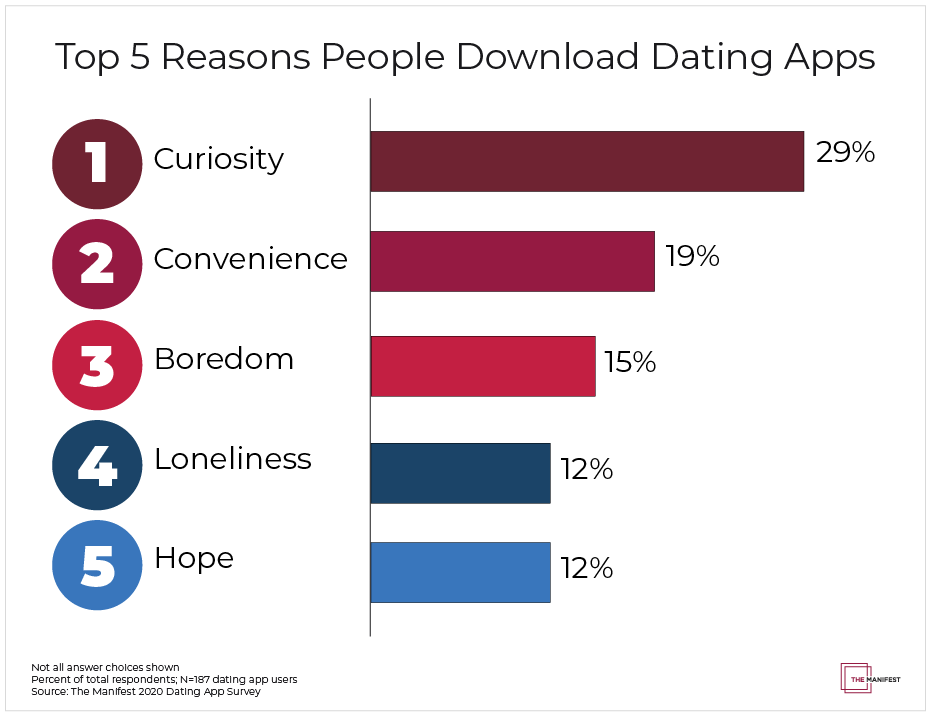
These motivators do not surprise McCann, a dating and relationship coach.
“Loneliness is a pervasive issue in today's world, even if someone has a robust social circle or close family, so it doesn't surprise me that is a reason people download a dating app,” McCann said. “The convenience factor is also highly appealing, as you can now meet people while relaxing in the comfort of your own home.”
Although curiosity, convenience, boredom, loneliness, and the hope of finding a partner are common motivators, they aren’t the only ones — 5% of users download dating apps because they just got out of a relationship and are looking for someone new (i.e., “rebounding”).

Most people’s decision to download a dating app, however, is typically a combination of these drivers.
Jeffrey Johnson, for example, met his wife on the OkCupid website before it was an app. When the relationship didn’t work out, he decided to join the dating apps trend.
“Initially, it was curiosity that motivated me to download a dating app,” Johnson, a writer for FreeAdvice.com, said. “I hadn’t been trying to date for over a decade. Maybe I would actually have some success now?”
Johnson said dating apps were fun, but he didn’t find anything “real.” To him, the apps felt more like a game than dating.
Now, he is considering deleting his dating app profiles.
Frank Salas, on the other hand, says he likes the convenience of dating apps. His career and lifestyle present him with challenges when it comes to dating because he travels to a new destination every 2-3 weeks.
“Dating apps make it easy to connect with and meet women from different [places] very easily,” Salas said.
Dating apps present a convenient way to meet people in new places and help Salas balance his career and personal life.
People are motivated to download dating apps, regardless of what they are looking for, whether something long-term or temporary.
Men Are Most Likely to Swipe Right on Looks, While Women Are Most Likely to Swipe on Shared Interests
Dating apps are notoriously superficial and require people to think about what’s most important to them in a potential match, such as looks, shared interests, and values.
For example, 40% of men are most likely to “swipe right” if the potential match is attractive, compared to 23% of women.
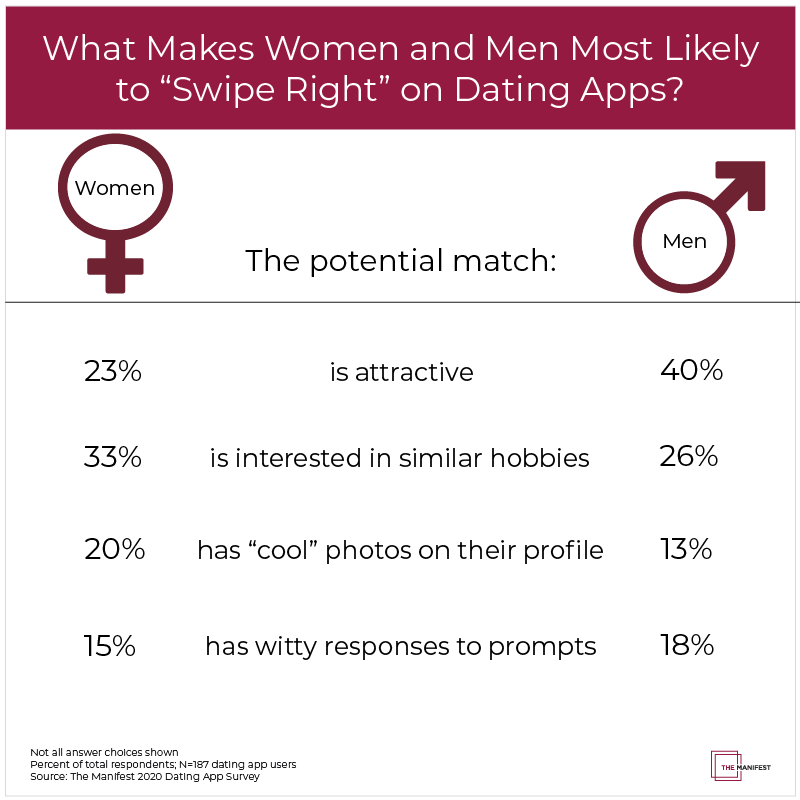
Conversely, 33% of women are most likely to swipe right on someone who exhibits similar interests and hobbies, compared to 26% of men.
Images play a large role in people’s decision-making process of swiping right, but users also value what’s written in the potential match’s profile.
“I swipe right if I find someone between 50 and 100 percent attractive, they have more than one photo available, and they’ve written a profile that includes full sentences,” said Jessica, a 23-year-old dating app user from Texas who wished to be kept anonymous.
Dating app users tend to have their own list of criteria when looking through options and typically choose those they find attractive and who exhibit similar interests.
Three-Quarters of People Have Blocked or Reported Another User for Inappropriate Behavior
Alexis Taylor woke up to a new Hinge message from “Brandon.” Unfortunately, it wasn’t what she was expecting when he sent an inappropriate message at 2 a.m.
“As I reported and blocked [him], I felt that little rush of dopamine that comes with the power of cutting someone entirely out of your life,” Taylor, a relationship expert, said.
Dating apps make it easy for people to meet others outside of their network. With this anonymity, however, comes unsolicited images and inappropriate messages, many of which are documented on the number of social media pages and threads dedicated solely to dating app nightmares.
As a result, 72% of dating app users have blocked another user (i.e., unmatched) at least once in the past six months.

But, sometimes, blocking a user isn’t enough: Most dating apps also allow users to report others behaving inappropriately directly to the platform.
Sixty percent (60%) of dating app users have reported someone to the platform for inappropriate behavior in the past six months.

People block and report other users for sending messages that are inappropriate or make them feel unsafe.
The impact of these encounters could have a negative impact on users’ mental well-being, even if they have the option to block or report those who make them feel uncomfortable.
Dr. Rob Whitley, an associate professor in the Department of Psychiatry at McGill University, wrote on Psychology Today that dating apps may have a damaging effect on users’ mental health for a number of reasons:
- Dating apps expose users to regular rejection, both spoken and unspoken (i.e., “ghosting”).
- Dating apps can nurture a culture of “human disposability,” or the idea that if one person isn’t exactly what you’re looking for, you can easily find a replacement.
- The anonymity of dating apps may make users feel comfortable sending inappropriate or explicit messages to another user — something they would likely think twice before doing in “real life.”
Inappropriate user behavior may even result in people deleting the app: 11% of people have deleted a dating app in the past six months because they didn’t feel safe using the app.

In January 2020, Tinder announced that it will start using AI and machine-learning technology to flag potentially offensive messages to stop harassment before it happens.
If a message contains words considered offensive, the app will ask the user, “Does this bother you?”
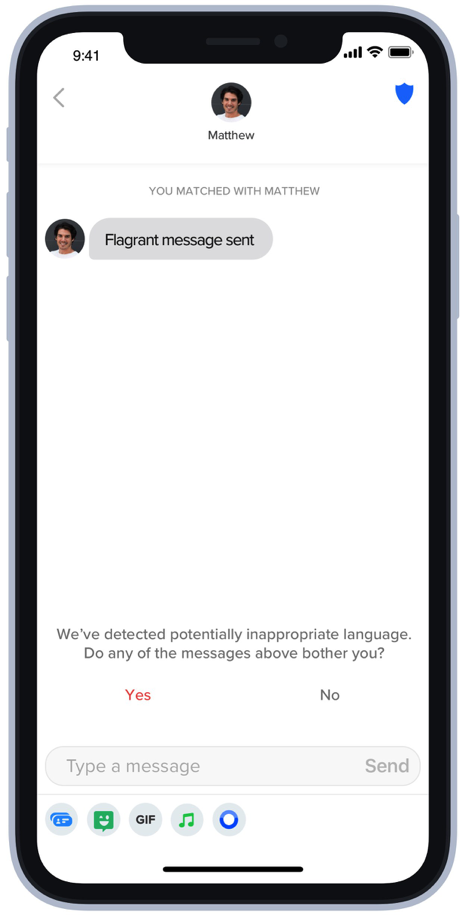
Over time, the algorithm will learn what is and is not offensive to individual users to offer a safer and more personalized dating app experience.
Tinder is also working on an “Undo” feature to discourage people from sending bothersome messages.
“If ‘Does This Bother You’ is about making sure you’re OK, Undo is about asking, ‘Are you sure?’” Rory Kozoll, Tinder’s head of trust and safety products, told Wired.
Previously, it was the responsibility of the one receiving these inappropriate, explicit messages to block or report the harasser.
In 2020, however, dating app platforms are beginning to hold their users more accountable by making it easier for users to report instances of harassment and urging users to mind their manners.
Boredom and Stress Cause People to “Break Up” With Dating Apps
According to McCann, two unintended consequences of dating apps include “choice paralysis” and “dating fatigue.”
Dating apps give people an infinitely larger dating pool. Choice paralysis stems from having an abundance of options (i.e., why choose just one?), and dating fatigue stems from the burnout associated with going on frequent dates and trying to make constant “connections.”
“People are having trouble committing to someone when there are so many other people to meet and explore,” McCann said. “Burnout is high. It's sad that although we've remedied the problem of where to meet people, we haven't really made it easier to find love. In some ways, it's become harder.”
Although we've remedied the problem of where to meet people, we haven't really made it easier to find love. In some ways, it's become harder.
As a result, dating app users frequently “swipe left” on dating apps themselves: 93% of users have deleted a dating app in the past six months.
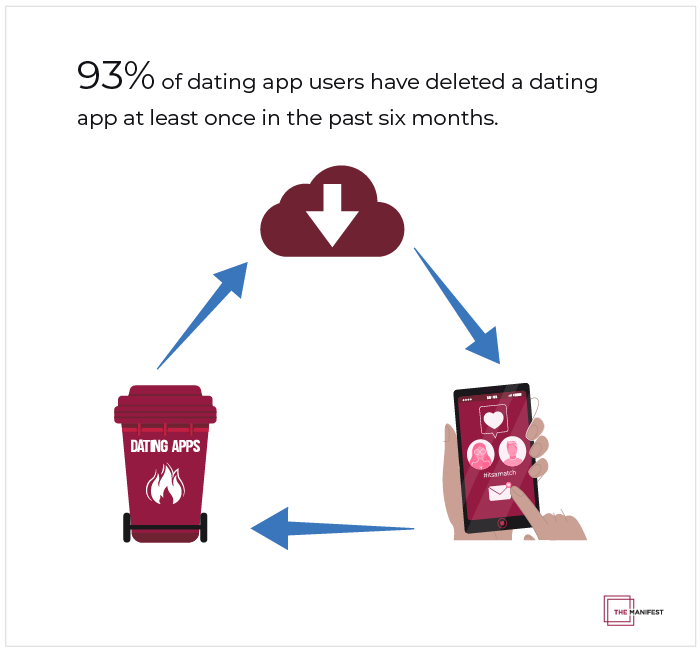
“I'm constantly deleting and re-downloading dating apps,” Jessica, the dating app user in Toronto, said. “They feel like a waste of time, swiping through and starting conversations only to have them end after 24 hours and never pick up again. Most of the time, it's really discouraging to use dating apps, and it feels like you'll never meet someone you actually like [or] want to be with.”
Most dating app users can relate to Jessica’s experiences. People delete dating apps because they:
- Become bored (25%)
- Become stressed using the apps (18%)
- Meet someone through the app they want to commit to (14%)
- Don't feel safe using the dating app (11%)
- Dislike using dating apps (9%)
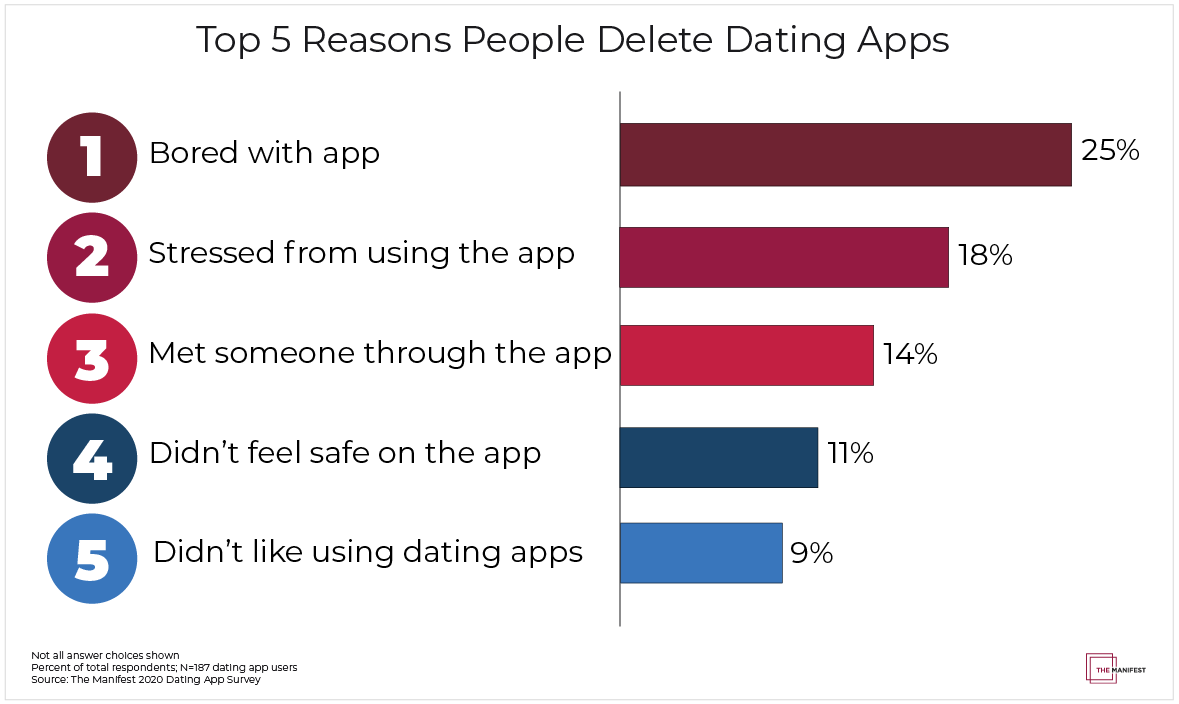
Dating apps not only have made some aspects of dating easier but also have introduced new challenges to the dating landscape.
Some people, like Jessica, adopt a download-delete cycle when it comes to dating apps, downloading the apps out of curiosity or boredom and deleting the apps when they get bored or become stressed using the app when it doesn’t meet their expectations.
Fewer people delete apps because they found their person and no longer have a need for the platform.
People Also Delete Dating Apps When the App “Works”
“Success” when it comes to dating apps may mean different things to different users, depending on what they hope to get from the dating app (e.g., something serious or something casual).
Fourteen percent (14%) of dating app users have deleted a dating app in the past six months because they found someone through the app they wanted to commit to.

For example, Shelley Yates, communications expert and founder of Yates Communication, met her husband on dating app Coffee Meets Bagel. It took her a year of using the app to meet her current husband, but she still enjoyed dating apps before that.
“I think the experience varies from person to person,” Yates said. “One of my friends exclusively used Bumble and met her husband from it. I had a similar experience with Coffee Meets Bagel, and another friend living in NYC swears by OkCupid.”
The number of downloads and users can’t determine the success of dating apps, unlike other mobile apps. Hinge, for example, uses the slogan “Designed to be deleted,” suggesting people will find “their person” and will no longer need the platform.
This 14% success rate might seem slim to those downloading dating apps to find something long-term, but it’s stories such as Yates’ that keep people downloading and using the apps.
Camille Virginia, the author of The Offline Dating Method, argues in her book that dating apps are designed for user engagement (i.e., “keep swiping!”) rather than the user’s desired outcome (e.g., “find love”), like casino games.
“Think about it: As soon as you find your lifelong partner, the platforms lose you as a customer,” Virginia wrote.
Virginia acknowledges the potential for success stories like Yates’ but encourages her readers not to rely on dating apps as their sole gateway to dating.
“Online dating has indeed worked for many and resulted in some happy relationships,” Virginia wrote. “But relying solely on these digital platforms means missing out on endless opportunities to meet the love of your life in the real world.”
Online dating has indeed worked for many and resulted in some happy relationships. But relying solely on these digital platforms means missing out on endless opportunities to meet the love of your life in the real world.
Dating apps can be a tool people use to meet others but shouldn’t be the only thing they use to meet potential partners.
Dating Apps Have Redefined the Social Realities of Modern Dating
Curiosity, convenience, boredom, loneliness, and hope drive people to download dating apps.
Dating apps can be superficial with their emphasis on images, but people can also see other users’ proximity and learn about others’ interests, hobbies, and aspirations, depending on how much information people choose to display on their profile.
Dating apps allow users control over who they talk to and give users the option to block or report users who abuse the platform and make them feel unsafe. Tinder is taking this a step further by implementing AI-powered algorithms that will work to minimize instances of harassment.
Most people delete dating apps, especially when they become bored or stressed using the app. Others delete the apps when they find someone they choose to commit to.
Regardless of people’s reasons for joining dating apps, experts encourage users to exercise caution when meeting up with other users and blocking or reporting those who make them feel unsafe.
About the Survey
The Manifest surveyed 187 dating app users in the U.S.
Most survey respondents are female (72%), and 28% are male.
Half of the respondents (50%) are ages 18-34, and 50% are ages 35-54.

